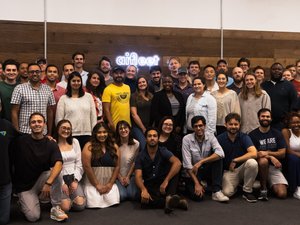
Austin startups may not land as many venture capital investment deals in 2018 as they did last year. But they're on track to raise far more money.
A new, mid-year report by PitchBook and the National Venture Capital Association counted 97 venture capital investments for Austin startups in the first half of the year. That would put the metro area on track for 192 deals -- less than any year since 2012 when the organizations counted 190 investments.
Meanwhile, local startups landed $824.3 million in investment in the first half of the year, topping the first half of any of the past six years. Texas as a whole saw $1.41 billion in investments through the end of June.
But measuring startup funding is a fickle thing due to the timing of reporting with the Securities and Exchange Commission and because of how different venture capital monitoring groups gather information and categorize fundings. Meanwhile, deal flow in the first half of the year isn't necessarily a yardstick for what happens in the second half.
The PitchBook-NVCA figures include investment from individual angel investors, angel groups, seed funds corporate venture arms and corporate investors. But it doesn't include initial fundings from accelerators.
Here are the top five deals reported in the Austin area in the PitchBook report.
- BigCommerce: $64 million Series F
- Shattuck Labs: $46.6 million from Rocky Point Ventures
- Dosh: $45 million Series A from Goodwater Capital and Paypal
- DisperSol Technologies: $27 millionfrom Research Corporation Technologies and Acadia Woods Partners
- Ojo Labs: $$20.6 million from Northwestern Mutual Capital, LiveOak Venture Partners, Silverton Partners, ServiceMaster, Realogy and Royal Bank of Canada
(The Austin figures do not appear to include WP Engine's $250 million commitment from Silver Lake.)
Now, for a look at other national trends from the report.
Angel/Seed Funding
When it comes to seed funding, deal sizes have gotten larger dominated by two trends — the emergence of pre-seed financing and the median age of startups. In Q2 2018, the median age of a company in the angel and seed stage rose to 3.11 years, up from 2.4 years in 2017, allowing for more time to develop successful business models and increase valuations.
Image Courtesy: Pitchbook
Early-stage
It’s not only angel and seed rounds that have gotten bigger. Early-stage deals have increased in value, too — deals over $25 million now make up more than 50 percent of 2018 early-stage deal value. Furthermore, the median amount of capital raised by companies at the Series A and B level has shown a steady growth pushing the median at Series A to $11.3 million and Series B to $29.3 million, representing a greater than twofold increase from 10 years ago, further illustrating the extreme shifts even at the early stage.
Image Courtesy: Pitchbook
Late-Stage
As mentioned earlier, late-stage deals have been getting a lot of attention. Another emerging trend is the increased activity by private equity (PE) investors as a result of increased competition in PE coupled with maturing venture-backed companies. VC financings with participation from a PE firm accounted for 30 percent of total deal value.
So far, $15 billion has been invested into 475 late-stage deals representing a remarkably steady volume of deals at the late stage. As investors retain their demand for developed businesses in the private markets, valuations have gotten loftier — valuations at the late stage in Q2 2018, which extended to $278 million—24 percent higher than 2017’s.
Image Courtesy: Pitchbook
Corporate VC
Thanks to the passage of US tax reform in late December of 2017, corporates have turned into venture capitalists. A reduction in the US corporate tax rate from 35 percent to 21 percent has been a boon for firms’ free cash flow (FCF), providing corporations with additional capital to direct into CVC investments. Software and life sciences sectors continue to receive increased focus from CVCs.
Image Courtesy: Pitchbook
Together, software and life sciences have received 62 percent of CVC deal count in 2018 so far. For instance, Lockheed Martin responded to the tax reform by increasing dedicated CVC capital by $100 million and invested in Mythic, a local artificial intelligence platform. Some prominent CVCs include GE, Boeing, Honeywell and Lockheed Martin. Defense companies especially have stepped up their investment game seeding a range of startups making new drones to batteries.
Austin Inno's Brent Wistrom contributed to this report.








